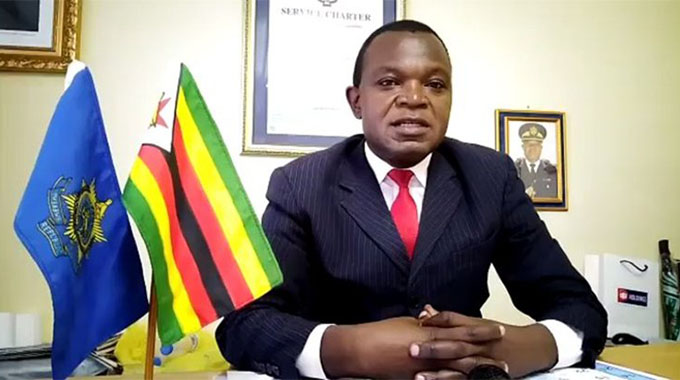Chamisa adopts world terrorist group symbol

Political Editor
NELSON Chamisa the leader of the newly formed Citizens Coalition for Change (CCC) has adopted the raised index finger symbol of the international radical terror group Islamic State (ISIS) in what observers said is a harbinger of the violence to come from the opposition party.
This comes after Mr Chamisa told a press conference on Monday that his party will take the terror to the Zimbabwe Electoral Commission (ZEC) if they lose the forthcoming general elections, scheduled for next year.
It also comes as one prominent activist William Chinyanga who supports Mr Chamisa is on trial in the United Kingdom on terrorism charges after he urged his followers to bomb the Zanu PF headquarters to remove a constitutionally elected Government.
Political commentator Alex Manyonga said the opposition’s latest symbol is a cause for concern as it could create a base for extremists in the country.
“Beyond the re-branding of Chamisa’s party into CCC lies the Islamic extremist symbol of pointing the index finger to the sky. Whereas this sounds like nothing, there is a need to give a telescopic look at it. Pointing a finger to the sky is well known as an Islamic extremist symbol. As such the adopting of such an extremist symbol needs not go unchecked especially in the wake of a marauding monster in the face of Ansar Al Sunna Militants in Mozambique.
“They has always been a threat from the opposition of resorting to violence in a bid to control the helm of politics in Zimbabwe. Given a series of tragic political adventures by the opposition in Zimbabwe, there is a very high likelihood of a destabilising marriage between the opposition and Islamic extremists in Zimbabwe. Zimbabwe has to take a leaf from the recent Mozambican extremist-led destabilisation. There have also been open solidarity sentiments and pledges of insurrection support from some Private Voluntary Organisations,” said Mr Munyonga.
Weighing in, another political analyst, Mr Collin Mharadzano said although the symbol might be coincidental, it has the potential of attracting dangerous elements into the country.
“The history of this political outfit is littered with controversy, a notion now reinforced by its symbol which draws its origins to die-hard militants who are spearheading terrorist activities elsewhere in the world. They have indeed begun on a wrong footing with such allegations already dodging them.
“It is also interesting to note that they are hyping on the so called ‘new’ when in essence this group has been at the forefront of fomenting idleness in urban centres epitomised by rampant corruption, excessive bureaucratic bungling, and general lethargy. Zimbabweans can see beyond these childish postures,” said Mr Mharadzano.
Spilling the beans, several MDC activists in a damascene moment, have detailed in astonishing detail how they were in the past paid by the party leadership and some embassies to cause mayhem in the country.
They also claimed to have trained in insurgents to perpetuate terror as was witnessed in 2018 and 2019 when they burned vehicles and barricaded roads to unconstitutionally remove the constitutionally elected Government of Zanu PF.
The Islamic State — also known as ISIS, ISIL, or Daesh — emerged from the remnants of al Qaeda in Iraq (AQI), a local offshoot of al Qaeda founded by Abu Musab al Zarqawi in 2004. It faded into obscurity for several years after the surge of US troops to Iraq in 2007. But it began to re-emerge in 2011. Over the next few years, it took advantage of growing instability in Iraq and Syria to carry out attacks and bolster its ranks.
The group changed its name to the Islamic State of Iraq and Syria (ISIS) in 2013. ISIS launched an offensive on Mosul and Tikrit in June 2014. On June 29, ISIS leader Abu Bakr al Baghdadi announced the formation of a caliphate stretching from Aleppo in Syria to Diyala in Iraq and renamed the group the Islamic State.
In 2015, ISIS expanded into a network of affiliates in at least eight other countries. Its branches, supporters, and affiliates increasingly carried out attacks beyond the borders of its so-called caliphate. In October, ISIS’s Egypt affiliate bombed a Russian airplane, killing 224 people. On November 13, 130 people were killed and more than 300 injured in a series of coordinated attacks in Paris. And in June 2016, a gunman who pledged support to ISIS killed at least four dozen people at a nightclub in Orlando, Florida.
The ISIS extremists are also linked to the terror groups destabilising part of Northern Mozambique, forcing SADC nations to intervene and to restore peace.









Comments